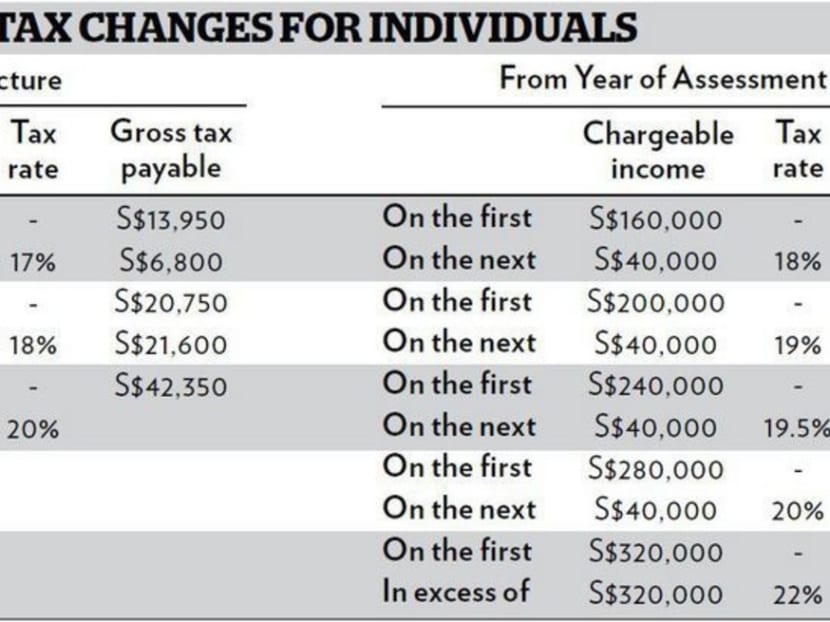Higher taxes for top 5% of earners
SINGAPORE — To bolster the Republic’s fiscal position for the medium-to-long term and after careful consideration, the Government will raise the personal income tax rate for the top 5 per cent of income earners, who draw at least S$160,000 in annual income.
SINGAPORE — To bolster the Republic’s fiscal position for the medium-to-long term and after careful consideration, the Government will raise the personal income tax rate for the top 5 per cent of income earners, who draw at least S$160,000 in annual income.
The increases will be larger for those earning the most: The top marginal rate for those earning above S$320,000 annually will be increased by two percentage points, from 20 per cent to 22 per cent. Smaller adjustments will be made for others in the top 5 per cent. The new tax rates will apply to income earned next year, for taxes to be paid in 2017.
For example, for someone earning S$250,000 a year, the effective tax rate will increase from 8.3 per cent to 8.5 per cent, with additional tax payable of S$400. A person with S$800,000 annual income will see his effective tax rate increase from 16 per cent to 17.4 per cent, with additional tax payable of about S$11,000, while the effective tax rate will increase from 17.9 per cent to 19.5 per cent for someone getting S$1.5 million a year — leading to an increase in tax of about S$25,000.
Overall, the change is expected to bring the Government an additional S$400 million in revenue annually, Deputy Prime Minister and Finance Minister Tharman Shanmugaratnam said yesterday. Along with the move to include Temasek Holdings in the Net Investment Returns framework, revenue equal to about 1 per cent of the Republic’s gross domestic product will be added annually to the Budget over the next five years.
While experts said the announcement during the Budget statement was a surprise, they felt it would have little impact on Singapore’s tax competitiveness, given that the Republic still boasts one of the lowest personal income tax rates in the region. They added that those thinking of basing themselves here also consider other factors, such as a country’s stability and security.
Mr Tharman said the “calibrated” move was taken after careful consideration. “We cannot take tax competitiveness lightly. The international competition for talent is real, for both Singaporeans and foreigners. Many Singaporean professionals are in fact working abroad, such as in Hong Kong,” he said.
He added that Singapore has other key strengths that have allowed it to remain competitive beyond tax rates. These include a cultural diverse and cohesive society, a family-friendly environment, clean air and a world-class healthcare system. “But it would be naive to think that we can keep raising tax rates without affecting our competitiveness,” he reiterated.
He said the Republic’s tax regime is designed to have lower overall taxes than most countries, while remaining highly progressive.
Outlining how the tax system here has been gradually transformed into a progressive one over the years, Mr Tharman added: “In other words, when we add up all our taxes — GST (Goods and Services Tax), income, property and other taxes — and compare them to benefits received, the low-income group gets more benefits than the taxes they pay, while the high-income pays more taxes than benefits received.”
Ms Wu Soo Mee, a human capital partner at Ernst & Young Solutions, said the latest move would not affect Singapore’s competitiveness. “An increase of two percentage points (in personal income tax rate) for someone of that income level isn’t that consequential,” she said. “As a country to work in, Singapore offers security and stability, which might not be easily found in other countries.”
Still, Mr Ooi BJ, head of global mobility services at KPMG Singapore, pointed out that top talent is very mobile. “Personal income tax is often one of the considerations ... when they decide where they wish to work … I think the Government is careful not to raise taxes too much or too fast ... This strategy is (meant) to cushion the system from serious shock.”
READ THE FULL BUDGET STATEMENT HERE
Other documents on Budget 2015 available on the Budget 2015 website.







